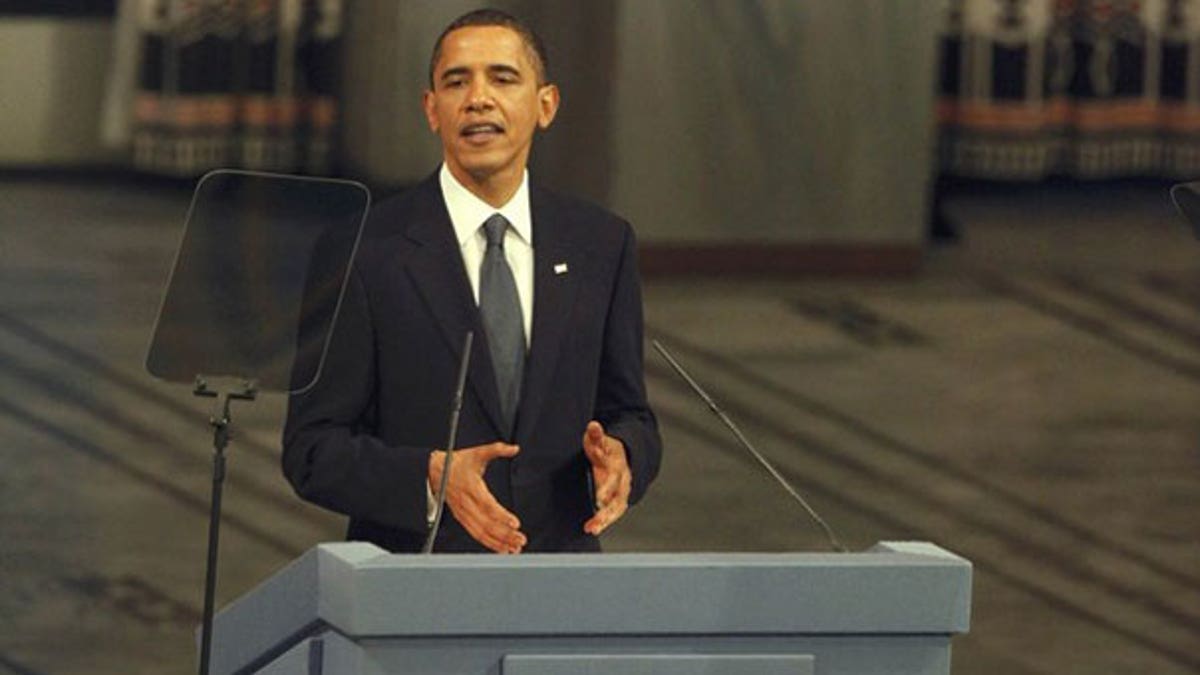
Dec. 10: Nobel Peace Prize laureate President Obama delivers the Nobel Lecture during the Nobel Peace Prize award ceremony in Oslo City Hall (Reuters).
President Obama, accepting the Nobel Peace Prize Thursday just days after expanding the Afghanistan war, acknowledged the controversy behind the award but vigorously defended his use of military force as a tool of "global security."
The president accepted the award in Oslo, Norway, with "deep gratitude and great humility." Addressing those who believe the prize was premature for a president who had not quite finished his first year in office, Obama conceded that his own accomplishments are "slight" compared with those of past recipients like Nelson Mandela.
"I would be remiss if I did not acknowledge the considerable controversy that your generous decision has generated. In part, this is because I am at the beginning, and not the end, of my labors on the world stage," Obama said.
From there, he launched into a lengthy defense of the war in Afghanistan, to which he ordered 30,000 more U.S. troops last week.
"I face the world as it is, and cannot stand idle in the face of threats to the American people," Obama said. "For make no mistake -- evil does exist in the world."
He highlighted his efforts to close Guantanamo Bay and ban the use of torture in the prosecution of that war, and called for more international cooperation. Obama said he was carrying out the war with great sensitivity, but ultimately defended its purpose.
"Perhaps the most profound issue surrounding my receipt of this prize is the fact that I am the commander-in-chief of the military of a nation in the midst of two wars. ... Some will kill. Some will be killed," Obama said. He added: "To say that force may sometimes be necessary is not a call to cynicism -- it is a recognition of history, the imperfections of man and the limits of reason. ... The belief that peace is desirable is rarely enough to achieve it."
Obama became the first sitting U.S. president in 90 years and the third ever to win the peace prize. Obama earlier said that criticism of his Nobel prize as premature might recede if he advances goals such as a nuclear-free world and tackling climate change.
But, he added, proving doubters wrong is "not really my concern."
"If I'm not successful, then all the praise in the world won't disguise that fact," he said.
The Nobel committee announced Obama had won the prize in October, when he wasn't even nine months on the job, recognizing his aspirations to reshape the way the U.S. deals with the world much more than his actual achievements. "It was a great surprise to me," Obama said after meeting with Norwegian Prime Minister Jens Stoltenberg. "I have no doubt that there are others who may be more deserving."
Obama announced just days before coming here to formally accept it that he is ordering 30,000 more American troops into war in Afghanistan. This did not go unnoticed: The president's motorcade arrived at Oslo's high-rise government complex to a few dozen anti-war protesters gathered behind wire fences nearby. Dressed in black hoods and waving banners, the demonstrators banged drums and chanted anti-war slogans. "The Afghan people are paying the price," some shouted.
Greenpeace and anti-war activists planned larger demonstrations later that were expected to draw several thousand people. Protesters have plastered posters around the city, featuring an Obama campaign poster altered with skepticism to say, "Change?"
Stoltenberg defended Obama as a Nobel laureate.
"I cannot think about anyone else who has done more for peace during the last year than Barack Obama," Stoltenberg said at Obama's side. "I think it's a very bold and important decision."
In awarding the prize to Obama, the Nobel panel cited his call for a world free of nuclear weapons, for a more engaged U.S. role in combating global warming, for his support of the United Nations and multilateral diplomacy and for broadly capturing the attention of the world and giving its people "hope."
But the list of Nobel peace laureates over the last 100 years includes transformative figures and giants on the world stage. They include heroes of the president, such as the Rev. Martin Luther King Jr., Mandela and others he has long admired, like George Marshall, who launched a postwar recovery plan for Europe.
So the choice of Obama was such a surprise, and derided so loudly by some critics as premature, that the Nobel committee took the unusual step of defending itself. Obama seemed Thursday to try to distance himself from that debate.
Obama's first stop in Oslo was the Norwegian Nobel Institute, where the Nobel committee meets to decide who gets the prestigious prize.
After signing the guest book at the Institute with a lengthy passage, Obama told reporters he had penned thanks to the committee members and noted the pictures of former winners filling the wall, saying that many gave "voice to the voiceless."
Obama's quick trip reflects a White House that sees little value in trumpeting an honor for peace just nine days after Obama announced he was sending more troops off to war.
The Nobel honor comes with a $1.4 million prize. The White House says Obama will give that to charities but has not yet decided which ones.
The Associated Press contributed to this report.




